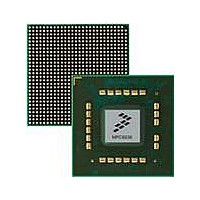MPC8536DS Freescale Semiconductor, MPC8536DS Datasheet - Page 607

MPC8536DS
Manufacturer Part Number
MPC8536DS
Description
BOARD DEV SYSTEM MPC8536E
Manufacturer
Freescale Semiconductor
Series
PowerQUICC III™r
Type
MPUr
Datasheets
1.MPC8536EBVTAVLA.pdf
(127 pages)
2.MPC8536EBVTAVLA.pdf
(1706 pages)
3.MPC8536DS.pdf
(2 pages)
4.MPC8536DS.pdf
(126 pages)
Specifications of MPC8536DS
Contents
Board, Software and Documentation
Processor Series
MPC85xx
Core
e500
Data Bus Width
32 bit
Maximum Clock Frequency
667 MHz
Operating Supply Voltage
- 0.3 V to + 1.21 V
Maximum Operating Temperature
+ 105 C
Data Ram Size
32 KB
Interface Type
SPI, USB
Program Memory Type
DDR2, DDR3, SDRAM
Core Size
32 Bit
Program Memory Size
544KB
Cpu Speed
1.5GHz
Digital Ic Case Style
BGA
No. Of Pins
783
Supply Voltage Range
0.95V To 1.05V
Rohs Compliant
Yes
For Use With/related Products
MPC8536
Lead Free Status / RoHS Status
Lead free / RoHS Compliant
- MPC8536EBVTAVLA PDF datasheet
- MPC8536EBVTAVLA PDF datasheet #2
- MPC8536DS PDF datasheet #3
- MPC8536DS PDF datasheet #4
- Current page: 607 of 1706
- Download datasheet (15Mb)
11.4.1.6
Address compare block determines if a slave has been properly addressed, either by its slave address or by
the general broadcast address (which addresses all slaves). The three performed address comparisons are
described as follows:
11.4.2
The I
on it. If two or more masters simultaneously try to control the bus, each master’s clock synchronization
procedure (including the I
clock low period and the high is equal to the shortest one among the masters. A bus master loses arbitration
if it transmits a logic 1 on SDA while another master transmits a logic 0. The losing masters immediately
switch to slave-receive mode and stop driving the SDA line. In this case, the transition from master to slave
mode does not generate a STOP condition. Meanwhile, the I
indicate the loss of arbitration and, as a slave, services the transaction if it is directed to itself.
If the I
11.4.2.1
The arbitration control block controls the arbitration procedure of the master mode. A loss of arbitration
occurs whenever the master detects a 0 on the external SDA line while attempting to drive a 1, tries to
generate a START or restart at an inappropriate time, or detects an unexpected STOP request on the line.
In master mode, arbitration by the master is lost (and I2CSR[MAL] is set) under the following conditions:
Note that the I
Freescale Semiconductor
•
•
•
•
•
•
•
•
•
•
•
2
C interface is a true multiple-master bus that allows more than one master device to be connected
2
— Ack cycle
Whether a broadcast message has been received, to update the I2CSR
Whether the module has been addressed as a slave, to update the I2CSR and to generate an interrupt
If the address transmitted by the current master matches the general broadcast address
Slave mode—The I
a subsequent START condition is detected.
Master mode—The I
condition is initiated, the current bus cycle can be corrupted. This ultimately results in the current
bus master of the I
SDA samples low when the master drives high during an address or data-transmit cycle (transmit).
SDA samples low when the master drives high during a data-receive cycle of the acknowledge
(Ack) bit (receive).
A START condition is attempted when the bus is busy.
A repeated START condition is requested in slave mode.
A start condition is attempted when the requesting device is not the bus owner
Unexpected STOP condition detected
C module is enabled in the middle of an ongoing byte transfer, the interface behaves as follows:
Arbitration Procedure
Address Compare—Implementation Details
Arbitration Control
2
C module does not automatically retry a failed transfer attempt.
MPC8536E PowerQUICC III Integrated Processor Reference Manual, Rev. 1
2
2
2
C module) determines the bus clock—the low period is equal to the longest
C interface losing arbitration, after which bus operations return to normal.
C module ignores the current transfer on the bus and starts operating whenever
2
C module cannot tell whether the bus is busy; therefore, if a START
2
C unit sets the I2CSR[MAL] status bit to
I
2
C Interfaces
11-15
Related parts for MPC8536DS
Image
Part Number
Description
Manufacturer
Datasheet
Request
R
Part Number:
Description:
Manufacturer:
Freescale Semiconductor, Inc
Datasheet:
Part Number:
Description:
Manufacturer:
Freescale Semiconductor, Inc
Datasheet:
Part Number:
Description:
Manufacturer:
Freescale Semiconductor, Inc
Datasheet:
Part Number:
Description:
Manufacturer:
Freescale Semiconductor, Inc
Datasheet:
Part Number:
Description:
Manufacturer:
Freescale Semiconductor, Inc
Datasheet:
Part Number:
Description:
Manufacturer:
Freescale Semiconductor, Inc
Datasheet:
Part Number:
Description:
Manufacturer:
Freescale Semiconductor, Inc
Datasheet:
Part Number:
Description:
Manufacturer:
Freescale Semiconductor, Inc
Datasheet:
Part Number:
Description:
Manufacturer:
Freescale Semiconductor, Inc
Datasheet:
Part Number:
Description:
Manufacturer:
Freescale Semiconductor, Inc
Datasheet:
Part Number:
Description:
Manufacturer:
Freescale Semiconductor, Inc
Datasheet:
Part Number:
Description:
Manufacturer:
Freescale Semiconductor, Inc
Datasheet:
Part Number:
Description:
Manufacturer:
Freescale Semiconductor, Inc
Datasheet:
Part Number:
Description:
Manufacturer:
Freescale Semiconductor, Inc
Datasheet:
Part Number:
Description:
Manufacturer:
Freescale Semiconductor, Inc
Datasheet:










